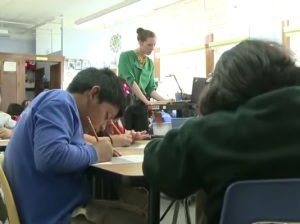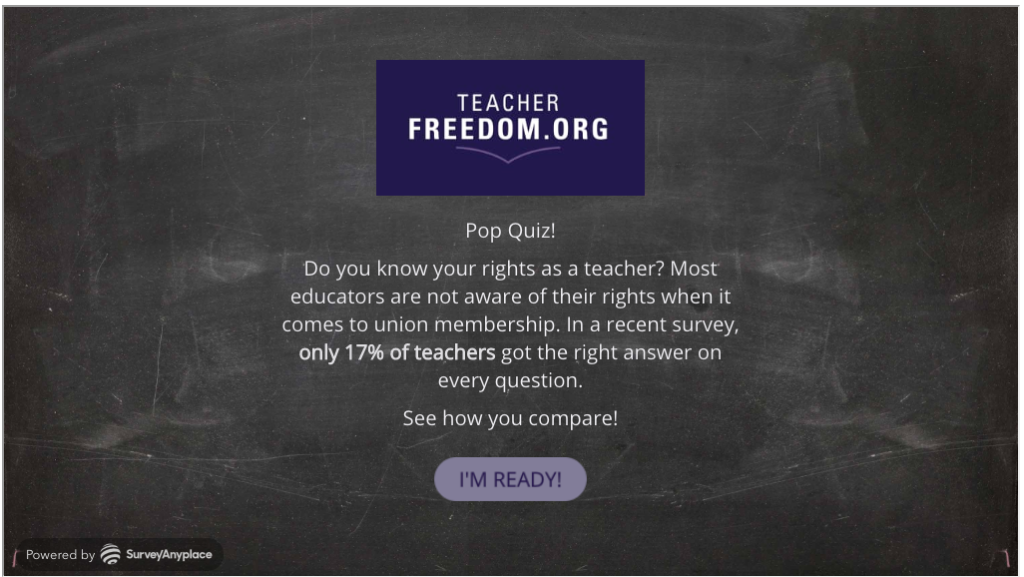Teachers: Do you know your rights when it comes to union membership?

While teachers have had a newly restored freedom of choice when it comes to union membership for over a year now, there is still an information gap regarding this choice and what it means for teachers.
According to a recent Teacher Freedom Project poll conducted by YouGov, 52 percent of teachers do not know that the Janus decision freed them from having to pay fees to leave their union. Eighty-three percent don’t fully understand their rights and what happens/doesn’t happen if they exercise this choice.
When asked eight questions about their rights and what happens outside of union membership, only 17 percent of teachers surveyed could answer all questions correctly. Click on the quiz below, courtesy of the Teacher Freedom Project, to see how well you do.
(Or, scroll down to read the questions and correct answers.)
Question 1
True or False:
If there is a union in a school/district but a teacher chooses not to become a member the terms of the negotiated agreement no longer apply to that teacher. [ANSWER: FALSE]
The Janus ruling had no effect on collective bargaining. The union will still negotiate wages, benefits, hours and working conditions with employers, and all employees—regardless of union membership status—will be covered by the union contract. As the exclusive representative of all employees in the bargaining unit, the union must represent all employees in good faith.
Question 2
True or False:
If there is a union in a school/district but a teacher chooses not to become a member that teacher would not receive any pay increases negotiated by the union. [ANSWER: FALSE]
See explanation above. Because the union fought for and won exclusive representation of both members and nonmembers, the terms negotiated in the collective bargaining agreement apply to all employees within that unit.
Question 3
True or False:
If there is a union in a school/district but a teacher chooses not to become a member that teacher would lose their health insurance benefits negotiated by the union. [ANSWER: FALSE]
Again, similar explanation as above. Benefits are negotiated between the employer and the union, but they are provided by the district employer. Because the union wants to be the exclusive representative of both members and nonmembers, whatever is negotiated applies to all employees—regardless of membership status.
Question 4
True or False:
If there is a union in a school/district but a teacher chooses not to become a member that teacher would lose liability insurance provided by the union. [ANSWER: TRUE]
Liability insurance provided by the union only applies to its members. However, the union is not the only provider of such coverage. There are nonunion associations designed just for teachers that offer liability coverage and other protections for a fraction of the cost of union dues. Click here to find out more about alternative education associations and their coverage options.
Question 5
True or False:
If there is a union in a school/district but a teacher chooses not to become a member that teacher would lose seniority status. [ANSWER: FALSE]
Teachers will not lose their seniority if they leave the union. A teacher’s union status does not jeopardize seniority.
Question 6
True or False:
If there is a union in a school/district but a teacher chooses not to become a member that teacher would lose their tenure protection. [ANSWER: FALSE]
Tenure and union association are separate things; tenure is set by the employer, the school district. A teacher’s union status does not jeopardize tenure.
Question 7
True or False:
If there is a union in a school/district but a teacher chooses not to become a member that teacher would not be allowed to attend union meetings. [ANSWER: TRUE]
Nonmembers cannot attend union meetings. But there are professional associations for teachers who do not want to belong to a union. These associations offer professional development opportunities, support, and community. Click here to find out more about these options.
Question 8
True or False:
If there is a union in a school/district but a teacher chooses not to become a member that teacher would be unable to vote on contract terms. [ANSWER: TRUE]
Nonmembers cannot vote on contract terms, but the terms of the negotiated agreement apply regardless of union membership status.

